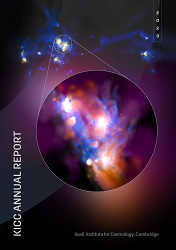
Submitted by Administrator on Wed, 13/01/2021 - 15:01
Researchers will use cutting-edge quantum technologies to transform our understanding of the universe and answer key questions such as the nature of dark matter and black holes.
Just as quantum computing promises to revolutionise traditional computing, technologies such as quantum sensors have the potential to radically change our approach to understanding our universe.
The projects are supported through the Quantum Technologies for Fundamental Physics programme, delivered by the Science and Technology Facilities Council (STFC) and the Engineering and Physical Sciences Research Council (EPSRC) as part of UKRI’s Strategic Priorities Fund. The programme is part of the National Quantum Technologies Programme.
AION: A UK Atom Interferometer Observatory and Network has been awarded £7.2 million in funding and will be led by Imperial College London. The project will develop and use technology based on quantum interference between atoms to detect ultra-light dark matter and sources of gravitational waves, such as collisions between massive black holes far away in the universe and violent processes in the very early universe. The team will design a 10m atom interferometer, preparing the construction of the instrument in Oxford and paving the way for larger-scale future experiments to be located in the UK. Members of the AION consortium will also contribute to MAGIS, a partner experiment in the US.
The Cambridge team on AION is led by Professor Valerie Gibson and Dr Ulrich Schneider from the Cavendish Laboratory, alongside researchers from the Kavli Institute for Cosmology, the Institute of Astronomy and the Department of Applied Mathematics and Theoretical Physics. Dr Tiffany Harte will co-lead the development of the cold atom transport and final cooling sequences for AION, and Dr Jeremy Mitchell will co-lead the data readout and network capabilities for AION and MAGIS, and undertake data analysis and theoretical interpretation.
“This announcement from STFC to fund the AION project, which alongside some seed funding from the Kavli Foundation, will allow us to target key open questions in fundamental physics and bring new interdisciplinary research to the University for the foreseeable future,” said Gibson.
“Every physical effect, known or unknown, leaves its fingerprint on the phase evolution of a coherent quantum system such as cold atoms; it only requires sufficiently sensitive detectors,” said Schneider. “We are excited to contribute our cold-atom technology to this interdisciplinary endeavour and to develop atom interferometry into a powerful detector for fundamental physics.”
Read the full press release here.


